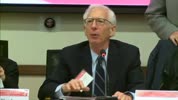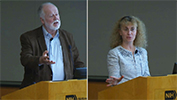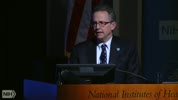-
- NIH VideoCast - Adventures in brain plasticity: from memory palaces to soulcycle
-
- - Wendy A. Suzuki, Ph.D., Professor of Neural Science and Psychology, New York University (2016/12/09)
- - Category : WALS - Wednesday Afternoon Lectures
- NIH Director`s Wednesday Afternoon Lecture Series
Brain plasticity, defined as the brain`s ability to learn and change in response to the environment, is a fundamental theme in neuroscience research today. One of the most common forms of brain plasticity is our ability to learn and retain new long-term memories for facts and events, a function that is dependent on the hippocampus and related structures in the medial temporal lobe. The memory palace is a technique originally developed by the ancient Greeks and Romans to efficiently encode and recall complex information. We now know that this approach is based on two key functions that are dependent on the structures of the medial temporal lobe. The first, termed associative memory, is the ability to quickly form new associations between unrelated items. The second, termed memory for temporal order, is the ability to construct a timeline for events in a sequence.
In the first part of the lecture, Dr. Suzuki will describe findings from neurophysiological experiments that show how the hippocampus and related structures contribute to both associative and temporal order memory. In the second part of the talk, she will turn to recent work that addresses the question of how to improve or enhance memory and other cognitive functions. This work is based on findings from both animal and human studies showing that physical aerobic exercise has both immediate and long-term beneficial effects on a wide range of cognitive functions including mood, memory, and attention. Dr. Suzuki will describe her studies that examine not only the effects of a single bout of aerobic exercise on cognitive functions, but the effects of long-term increases in physical aerobic activity on cognitive functions in healthy adults. She will also discuss the neurochemical pathways and mechanisms that may be underlying these cognitive changes based on a key growth factor, brain-derived neurotrophic factor.
For more information go to https://oir.nih.gov/wals/2016-2017/adventures-brain-plasticity-memory-palaces-soulcycle
NIH VideoCast - Adventures in brain plasticity: from memory palaces to soulcycle
-
- NIH VideoCast - Modeling Zika virus in mice: What have we learned so far?
-
- - Mohanraj Manangeeswaran, Ph.D., FDA (2016/12/09)
- - Category : Immunology
- Immunology Interest Group Seminar Series
The recent spread of Zika virus (ZIKV) and its association with increased rates of Guillain Barre and other neurological disorders as well as congenital defects that include microcephaly has created an urgent need to develop animal models to examine the pathogenesis of the disease and explore the efficacy of potential therapeutics and vaccines. Recently developed infection models for ZIKV utilize mice defective in interferon responses. This talk will describe a new model of peripheral ZIKV infection using immunocompetent neonatal C57BL/6 mice and compare its clinical progression, virus distribution, immune response, and neuropathology with that of C57BL/6-IFNAR KO mice.
Mohanraj Manangeeswaran obtained a PhD in bacterial genetics from the University of Madras, India where he studied the catabolic potential of Serratia marcescens. In 2004, he accepted a joint postdoctoral appointment at the Stanford University School of Medicine and the Laboratory of Emerging Pathogens at CBER-FDA to work with Gerardo Kaplan on the TIM (T cell immunoglobulin and mucin) receptor gene family. There he explored their role as receptors for hepatitis A virus (HAV) showing that binding of Hepatitis A virus to its receptor HAVCR1 prevents cells from binding and taking up apoptotic cells. Further, the virus directly blocked the activation of T cells including regulatory T cells. The resulting reduction in inflammation may be associated with the limited virus-induced liver damage in HAV infection. He then shifted his focus to emerging viruses examining the role of TIM1 in Ebola and showing that the interaction of the virus with the TIM1 is indirect. In 2012 he joined the Verthelyi lab at FDA where he continued his work by developing new animal models for Sindbis and Zika virus and exploring whether innate immune response modulators can be used to modify the host immune response and reduce neurological damage caused by neurotropic viruses.
NIH VideoCast - Modeling Zika virus in mice: What have we learned so far?
-
- NIH VideoCast - NIH Common Fund High-Risk, High-Reward Research Symposium - Day 1
-
- - NIH (2016/12/08)
- - Category : Conferences
- The NIH Common Fund is pleased to announce the 2016 High-Risk, High-Reward Research Symposium. The symposium will take place December 5-7, 2016, and will be held in the Natcher Conference Center on the NIH Main Campus in Bethesda, MD. The symposium will bring together recipients of the Pioneer, New Innovator, Transformative Research, and Early Independence Awards to share groundbreaking research and discoveries.
NIH VideoCast - NIH Common Fund High-Risk, High-Reward Research Symposium - Day 1
-
- NIH VideoCast - NCI Board of Scientific Advisors and the National Cancer Advisory Board - December 2016
-
- - NCI, NIH (2016/12/08)
- - Category : National Cancer Advisory Board
- The 8th Joint Meeting of the NCI Board of Scientific Advisors and the National Cancer Advisory Board
NIH VideoCast - NCI Board of Scientific Advisors and the National Cancer Advisory Board - December 2016
-
- NIH VideoCast - Advisory Committee on Blood and Tissue Safety and Availability - November 2016 (Day 2)
-
- - U.S. Dept. of Health & Human Services, Office of the Assistant Secretary for Health (2016/12/03)
- - Category : Advisory Board Meetings and Workshops
- 48th meeting of the Advisory Committee on Blood & Tissue Safety & Availability
For more information go to http://www.hhs.gov/ohaidp/initiatives/blood-tissue-safety/advisory-committee/meetings/2016-11-28/index.html
NIH VideoCast - Advisory Committee on Blood and Tissue Safety and Availability - November 2016 (Day 2)
-
- NIH VideoCast - Muscular Dystrophy Coordinating Committee (MDCC) Meeting - November 2016
-
- - NIH (2016/12/02)
- - Category : Advisory Board Meetings and Workshops
- The Muscular Dystrophy Community Assistance, Research, and Education Amendments of 2001 ("MD-CARE Act"; P.L. 107-84) authorized the establishment of the Muscular Dystrophy Coordinating Committee (MDCC) to coordinate activities across NIH and with other Federal health programs and activities relevant to the various forms of muscular dystrophy including Duchenne, myotonic, facioscapulohumeral muscular dystrophy and other forms of muscular dystrophy. The purpose of this meeting is to bring together committee members, representing government agencies, patient advocacy groups, other voluntary health organizations, and patients and their families to update one another on progress relevant to the Action Plan for the Muscular Dystrophies and to coordinate activities and discuss gaps and opportunities leading to better understanding of the muscular dystrophies, advances in treatments, and improvements in patients??? and their families??? lives.
NIH VideoCast - Muscular Dystrophy Coordinating Committee (MDCC) Meeting - November 2016
-
- NIH VideoCast - Clinicopathologic Grand Rounds: Clinical Cases from the NIH Clinical Center: Mucormycosis Management: The Challenges of Transitioning from Medieval Medicine to the Modern Era
-
- - 1) Phuong Vo, MD Clinical Fellow, NHLBI, NIH 2) Michail S. Lionakis, MD, ScD Chief, Fungal Pathogenesis Unit, Laboratory of Clinical Infectious Diseases, NIAID, NIH and 3) Richard W. Childs, MD Clinical Director, NHLBI, NIH and Senior Investigator and Chief, Laboratory of Transplantation Immunotherapy, NHLBI, NIH (2016/12/02)
- - Category : Clinical Center Grand Rounds
- Clinicopathologic Grand Rounds: Clinical Cases from the NIH Clinical Center:
Mucormycosis Management: The Challenges of Transitioning from Medieval Medicine to the Modern Era
For more information go to http://www.cc.nih.gov/about/news/grcurrent.html
NIH VideoCast - Clinicopathologic Grand Rounds: Clinical Cases from the NIH Clinical Center: Mucormycosis Management: The Challenges of Transitioning from Medieval Medicine to the Modern Era
-
- NIH VideoCast - Digging for genes that contribute to behavioral evolution
-
- - Hopi Hoekstra, Ph.D.,Professor, Harvard University; Member, The Broad Institute; Investigator, Howard Hughes Medical Institute (2016/12/02)
- - Category : WALS - Wednesday Afternoon Lectures
- NIH Director`s Wednesday Afternoon Lecture Series
Dr. Hoekstra is an evolutionary geneticist who studies the molecular basis of adaptation in wild deer mice. Her work spans the fields of evolution, behavior, morphology, genetics, genomics, development, and neurobiology. Her first major work focused on the genetic basis of cryptic coloration in wild mice, but more recently her lab has extended this work to study the genetic and neural basis of natural behaviors.
Understanding which genes affect behavior, and how the resultant proteins work in the brain, remains a major challenge in biology. To address this goal, Dr. Hoekstra`s lab is capitalizing on natural variation in behavior within and among species of wild mice. For her lecture, Dr. Hoekstra will focus on an innate behavior, burrowing, which produces an intriguing and complex animal architecture. She will present data from both the lab and the field that allow us a first glimpse into the genetics and neurobiology of behavioral evolution.
For more information go to https://oir.nih.gov/wals/2016-2017
NIH VideoCast - Digging for genes that contribute to behavioral evolution
-
- NIH VideoCast - Unraveling T Cell Dysfunction: from Co-Inhibitory Receptors to Molecular Programs
-
- - Ana Carrizossa Anderson, PhD, Associate Scientist, Brigham and Women`s Hospital, Assistant Professor of Neurology, Harvard Medical School (2016/12/02)
- - Category : Immunology
- Immunology Interest Group Seminar Series
In chronic diseases such as cancer and chronic viral infections, T cells acquire a dysfunctional state characterized by variable loss of effector functions. Dysfunctional T cells express multiple co-inhibitory receptors, such as CTLA-4 and PD-1, and blockade of these receptors has been harnessed to improve T cell responses and clinical outcome in multiple cancer indications. Unfortunately, the current therapies directed against CTLA-4 and PD-1 do not reach all patients and resistance to these therapies is increasing. This has prompted intense investigation into gaining a deeper understanding of the relationship of co-inhibitory receptors to the dysfunctional T cell state as well as achieving a more precise molecular definition of T cell dysfunction. To this end, we have investigated the cell extrinsic mechanisms that contribute to T cell dysfunction as well as the cell intrinsic gene programs that give rise to this T cell state. Through these studies we have uncovered extracellular signals that drive co-inhibitory receptor expression on T cells as well as important roles for co-inhibitory receptor expression on regulatory T cells in promoting T cell dysfunction. Importantly, we have uncovered a cell intrinsic role for zinc metabolism downstream of intracellular metallothioneins in driving T cell dysfunction. Through population and single-cell RNA profiling of wild type and metallothionein deficient T cells, we have identified a distinct gene module for T cell dysfunction that can be uncoupled from T cell activation. Our findings increase our current understanding of co-inhibitory receptors and T cell dysfunction and open novel avenues for targeting the dysfunctional T cell state, while leaving gene programs important for T cell activation intact.
NIH VideoCast - Unraveling T Cell Dysfunction: from Co-Inhibitory Receptors to Molecular Programs
-
- NIH VideoCast - Advisory Committee on Blood and Tissue Safety and Availability - November 2016 (Day 1)
-
- - U.S. Dept. of Health & Human Services, Office of the Assistant Secretary for Health (2016/12/01)
- - Category : Advisory Board Meetings and Workshops
- 48th meeting of the Advisory Committee on Blood & Tissue Safety & Availability
For more information go to http://www.hhs.gov/ohaidp/initiatives/blood-tissue-safety/advisory-committee/meetings/2016-11-28/index.html
NIH VideoCast - Advisory Committee on Blood and Tissue Safety and Availability - November 2016 (Day 1)
-
- NIH VideoCast - TRACO 2016: Precision Medicine and Nanotechnology
-
- - Curtis C. Harris, M.D., NCI, NIH and Marina Dobrovolskaia, MD, NCI, NIH (2016/11/30)
- - Category : TRACO
- Precision Medicine and Nanotechnology
For more information go to http://ccr.cancer.gov/trainee-resources-courses-workshops-traco
NIH VideoCast - TRACO 2016: Precision Medicine and Nanotechnology
-
- NIH VideoCast - Do the right thing: Inhibitory control of behavior in Drosophila
-
- - Scott Waddell, Ph.D., Professor of Neurobiology and Wellcome Trust Senior Research Fellow, Department of Physiology, Anatomy and Genetics, University of Oxford (2016/11/29)
- - Category : Neuroscience
- NIH Neuroscience Series Seminar
Scott Waddell studied biochemistry as an undergraduate at the University of Dundee, and researched cancer biology for his Ph.D. at the University of London. After postdoctoral study in the Department of Brain and Cognitive Sciences at Massachusetts Institute of Technology he spent 10 years leading a research group in the Department of Neurobiology at the University of Massachusetts Medical School. Scott moved to Oxford as a Professor of Neurobiology and founding member of the Centre for Neural Circuits & Behaviour in November 2011. His group has studied neural circuit properties of memory-directed behaviour in the fruit fly since 2001, and has recently ventured into neural transposition. Scott is a member of EMBO and was awarded the 2014 Liliane Bettencourt Prize for the Life Sciences.
For more information go to https://neuroscience.nih.gov/neuroseries/Home.aspx
NIH VideoCast - Do the right thing: Inhibitory control of behavior in Drosophila
-
- NIH VideoCast - Introduction to the Principles and Practice of Clinical Research (IPPCR): Dissemination and Implementation Research
-
- - Catherine Stoney, Ph.D., NHLBI, NIH (2016/11/24)
- - Category : IPPCR
- The Introduction to the Principles and Practice of Clinical Research (IPPCR) is a course to train participants on how to effectively conduct clinical research. The course focuses on the spectrum of clinical research and the research process by highlighting epidemiologic methods, study design, protocol preparation, patient monitoring, quality assurance, and Food and Drug Administration (FDA) issues.
For more information go to http://clinicalcenter.nih.gov/training/training/ippcr1.html
NIH VideoCast - Introduction to the Principles and Practice of Clinical Research (IPPCR): Dissemination and Implementation Research
-
- NIH VideoCast - Introduction to the Principles and Practice of Clinical Research (IPPCR): Health Disparities Research
-
- - Larissa Avil챕s-Santa, M.D., M.P.H., FACP, FACE, NHLBI, NIH (2016/11/24)
- - Category : IPPCR
- The Introduction to the Principles and Practice of Clinical Research (IPPCR) is a course to train participants on how to effectively conduct clinical research. The course focuses on the spectrum of clinical research and the research process by highlighting epidemiologic methods, study design, protocol preparation, patient monitoring, quality assurance, and Food and Drug Administration (FDA) issues.
For more information go to http://clinicalcenter.nih.gov/training/training/ippcr1.html
NIH VideoCast - Introduction to the Principles and Practice of Clinical Research (IPPCR): Health Disparities Research
-
- NIH VideoCast - Principles of Clinical Pharmacology ~ Nonclinical Drug Development
-
- - Chris Takimoto, MD, PhD, Forty Seven Inc. (2016/11/24)
- - Category : Principles of Clinical Pharmacology
- The "Principles of Clinical Pharmacology" course is a weekly lecture series covering the fundamentals of clinical pharmacology as a translational scientific discipline focused on rational drug development and utilization in therapeutics. The course is offered annually at the NIH Clinical Center and runs from September through April.
NIH VideoCast - Principles of Clinical Pharmacology ~ Nonclinical Drug Development
-
- NIH VideoCast - Introduction to the Principles and Practice of Clinical Research (IPPCR): Study Budget Development
-
- - Phyllis Klein, R.N., C.C.R.C., B.S.N., Director, Regulatory Support and Compliance, Washington University in St. Louis (2016/11/24)
- - Category : IPPCR
- The Introduction to the Principles and Practice of Clinical Research (IPPCR) is a course to train participants on how to effectively conduct clinical research. The course focuses on the spectrum of clinical research and the research process by highlighting epidemiologic methods, study design, protocol preparation, patient monitoring, quality assurance, and Food and Drug Administration (FDA) issues.
For more information go to http://clinicalcenter.nih.gov/training/training/ippcr1.html
NIH VideoCast - Introduction to the Principles and Practice of Clinical Research (IPPCR): Study Budget Development
-
- NIH VideoCast - Marijuana and Cannabinoids: A Neuroscience Research Summit (Day 1)
-
- - NIDA, NIAAA, NCCIH, NIMH and NINDS (2016/11/24)
- - Category : Conferences
- To ask QUESTIONS during the Summit Q&A sessions: Tweet your questions using the hashtag #MJNeuroSummit
Marijuana and Cannabinoids: A Neuroscience Research Summit is being convened by the National Institutes of Health (NIH), which will focus on the neurological and psychiatric effects of marijuana, other cannabinoids, and the endocannabinoid system. Both the adverse and the potential therapeutic effects of the cannabinoid system will be discussed. The goal of this summit is to ensure evidence-based information is available to inform practice and policy, particularly important at this time given the rapidly shifting landscape regarding the recreational and medicinal use of marijuana.
This two day summit is being sponsored by several NIH Institutes and Centers: the National Institute on Drug Abuse (NIDA); the National Institute on Alcohol Abuse and Alcoholism (NIAAA); the National Center for Complementary and Integrative Health (NCCIH); the National Institute of Mental Health (NIMH); and the National Institute of Neurological Disorders and Stroke (NINDS).
Sign-up Here: http://apps1.seiservices.com/nih/mj/2016/VideoCast.aspx
For more information about the meetings speakers and agenda please visit
http://apps1.seiservices.com/nih/mj/2016/Default.aspx
NIH VideoCast - Marijuana and Cannabinoids: A Neuroscience Research Summit (Day 1)
-
- NIH VideoCast - Introduction to the Principles and Practice of Clinical Research (IPPCR): The Clinical Researcher and the Media
-
- - John Burklow, M.S., NIH (2016/11/24)
- - Category : IPPCR
- The Introduction to the Principles and Practice of Clinical Research (IPPCR) is a course to train participants on how to effectively conduct clinical research. The course focuses on the spectrum of clinical research and the research process by highlighting epidemiologic methods, study design, protocol preparation, patient monitoring, quality assurance, and Food and Drug Administration (FDA) issues.
For more information go to http://clinicalcenter.nih.gov/training/training/ippcr1.html
NIH VideoCast - Introduction to the Principles and Practice of Clinical Research (IPPCR): The Clinical Researcher and the Media
-
- NIH VideoCast - Marijuana and Cannabinoids: A Neuroscience Research Summit (Day 2)
-
- - NIDA, NIAAA, NCCIH, NIMH and NINDS (2016/11/24)
- - Category : Conferences
- To ask QUESTIONS during the Summit Q&A sessions: Tweet your questions using the hashtag #MJNeuroSummit
Marijuana and Cannabinoids: A Neuroscience Research Summit is being convened by the National Institutes of Health (NIH), which will focus on the neurological and psychiatric effects of marijuana, other cannabinoids, and the endocannabinoid system. Both the adverse and the potential therapeutic effects of the cannabinoid system will be discussed. The goal of this summit is to ensure evidence-based information is available to inform practice and policy, particularly important at this time given the rapidly shifting landscape regarding the recreational and medicinal use of marijuana.
This two day summit is being sponsored by several NIH Institutes and Centers: the National Institute on Drug Abuse (NIDA); the National Institute on Alcohol Abuse and Alcoholism (NIAAA); the National Center for Complementary and Integrative Health (NCCIH); the National Institute of Mental Health (NIMH); and the National Institute of Neurological Disorders and Stroke (NINDS).
Sign-up Here: http://apps1.seiservices.com/nih/mj/2016/VideoCast.aspx
For more information about the meetings speakers and agenda please visit
http://apps1.seiservices.com/nih/mj/2016/Default.aspx
NIH VideoCast - Marijuana and Cannabinoids: A Neuroscience Research Summit (Day 2)
-
- NIH VideoCast - Workshop on Basic and Translational Research in Cerebral Palsy (Day 1)
-
- - NIH (2016/11/24)
- - Category : Conferences
- This workshop will be an important event for the cerebral palsy research community and will aid NIH by providing an up-to-date assessment of the science focused on cerebral palsy and planning for future scientific investments.
NIH VideoCast - Workshop on Basic and Translational Research in Cerebral Palsy (Day 1)






















